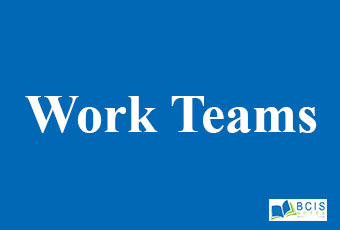
Work teams
Work Teams is a collective performance with contemporary skills who are committed to a common purpose, common performance, goals, and an approach for which they hold themselves mutually accountable.
Definitions:
“A group whose individual efforts result in a performance that is greater than the sum of the individual inputs.” S.P. Robbins
” A team is a small number of people with complementary skills who are committed to a common purpose, common performance, goals, and an approach for which they hold themselves mutually accountable.” Moorhead and Griffin
Concept:
The ideology of the team can be broadly classified in four orientations viz, power, role, task, and performance. If the ideology of the team and the preferred ideology of the members is also of the same then there will be the perfect match and members can have a sound psychological contract with the team. Team work improves productivity, employee motivation, satisfaction, job skills, organizational flexibility and commitment to achieve common goals.
Team :“Together Everyone Achieve More”
Team is the cooperative group where individual efforts result in positive synergy through coordinated efforts. The team performance is greater than the sum of what its members perform as individual.
Benefits of Teams in Organizations
| Types of benefit: | Special benefit: | Organizational examples: |
|---|---|---|
| Enhanced performance | Increased productivity, Improved quality, Improved customer service |
Ampex: On-time customer delivery rose 98% |
| Employee benefits: | Quality of work life Lower stress |
Milwaukee mutual: Employee assistance program usage dropped to 40% below industry average.
|
| Reduced costs: | Lower turnover, absenteeism, fewer injuries |
Kodak: reduced turnover to one-half the industry average. |
| Organizational enhancements: | Increased innovation, flexibility |
IDS Mutual Fund Operations: Improved flexibility to handle fluctuations in market activity. |
Characteristics:
- Collective performance
- Positive synergy
- Shared leadership roles
- Individual and mutual accountability
- Multiple skills
- Interaction and influence
- Team based reward
Types of Work Teams:
- Problem solving teams
- Cross functional teams
- Virtual teams
- Self managed teams
| Problem solving teams | Cross functional teams | Virtual teams | Self managed teams |
|
|
These teams use information technology and computers to tie together physically dispersed members in order to achieve a common goal.
|
Defines its own goals. Team members are interdependent. |
| Problem solving teams share ideas and offer suggestions. |
|
Members collaborate online through communication links. | Self regulating, operating with few external controls. |
| They lack authority to make and implement decisions.
For ex: Quality circles |
Generate more ideas and alternative solutions
For Ex- Project team |
They lack face to face communication.
They have limited social interaction. |
Full responsibilities for outcomes. Evaluate each other performance. |
Team performance factors:
- Cohesiveness. The first factor to consider is how cohesive members are with one another.
- Communication. Efficient communication mechanisms are crucial to develop effective teams.
- Groupthink.
- Homogeneity.
- Role Identity.
- Stability.
- Team Size.
Building effective work teams:
- Concept
- Context
- Composition
- Work design
- Process
OR
1. Set Guidelines
2. Focus teams on performance
3. Revisit work design
- Autonomy
- Skill variety
- Task identity
- Task significance
4. Manage conflicts within teams
Group decision making:
Decision making is the process of selecting a course of action from a number of alternatives. It involves diagnosis, defining, identify the source of the problem and information gathering and analysis of the facts.
- The quality and timeliness of decisions making process can have significant impact on group effectiveness.
- The benefit of the group decision making facilitates resource utilization, implementation and problem solving.
Techniques:
Brainstorming:
This technique is an active process of discussion by generating ideas and alternatives as far as possible between member of the group.
Delphi Technique:
It is technique or method, developed as a systematic, interactive decision making method which relies on a panel of experts.
Nominal Group Technique:
is a group process involving problem identification, solution generation, and decision making. It can be used in groups of many sizes, who want to make their decision quickly, as by a vote, but want everyone’s opinions taken into account.
Issues in managing work teams:
- Team performance
- Team and Total Quality Management(TQM)
- Team and Workforce Diversity
- Reinvigorating maturing teams
- From where to start team work?
You may also like Leadership || Motivation and Leadership || Organizational Behavior

Leave a Reply